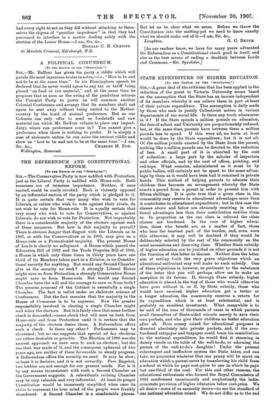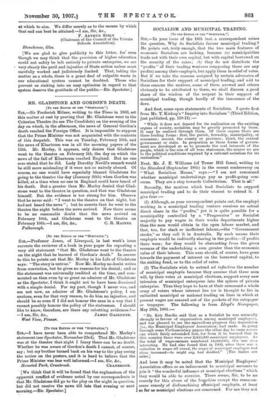STATE EXPENDITURE ON HIGHER EDUCATION.
[TO THE EDITOR OF THE "SPECTATOR:1
SIR,-A great deal of the criticism that has been applied to the reduction of the grant to Victoria University seems based on the assumption that the State has an income independent of its members whereby it can relieve them in part at least of their private expenditure. This assumption is daily made by those who seek to justify Collectivist action in various departments of our social life. Is there any truth whatsoever in it ? If the State spends a million pounds on education, the fees of school and University are proportionately reduced, but, at the same time, parents have between them a million pounds less to spend. If this were all, no harm at least would be done by the State expenditure; but it is not all. Of the million pounds exacted by the State from the parent, nothing like a million pounds can be devoted to the reduction of fees. A small part of it is absorbed by the cost of collection : a large part by the salaries of inspectors and other officials, and by the cost of offices, printing, and red-tape. What remains, administered as it must. be by public bodies, will certainly not be spent to the same advan- tage by them as it would have been had it remained in private hands. This method of helping parents to educate their children thus becomes an arrangement whereby the State exacts a pound from a parent in order to present him with fifteen shillings. It is quite true that a given class in the community may receive in educational advantages more than it contributes in educational expenditure; but in this case the classes above and below are obviously receiving in educa- tional advantages less than their contribution entitles them to. In proportion as the one class is relieved the other classes are burdened. In the case of higher educa- tion, those who benefit are, as a matter of fact, those who bear the heaviest part of the burden, and, even were this otherwise, it may well be doubted if they would be deliberately selected by the rest of the community as the most necessitous and deserving class. Whether State subsidy of higher education can be justified on other grounds it is not the function of this letter to discuss. Neither does the letter aim at setting forth the very grave objections which an educational enthusiast may well make to such subsidy. One of these objections is, however, so pertinent to the substance of the letter that you will perhaps allow me to make an exception in its favour. If, through State subsidy, higher education is placed in the way of those who would otherwise have gone without it, or if, by State subsidy, those who would have received higher education get a better or a longer education, the community receives a return for its expenditure which is at least substantial, and is probably an excellent investment. What meanwhile is to be said of the tens of thousands of cases in which parents avail themselves of State-aided schools merely to save their own pockets, and who give their children no better education after all. Here money raised for educational purposes is diverted absolutely into private pockets, and, if the over- burdened ratepayer and taxpayer could trace his contribution to the national expenditure, he would find it steaming in dainty viands on the table of the well-to-do, or adorning the person of the well-to-do's daughter! Under the present extravagant and ineffective system the State takes, and can take, no guarantee whatever that one penny will be spent on education which a parent saves by transferring his child from a school at which he pays cost-price to one in which he pays but one-third of the cost. For this and other reasons, the educational enthusiasts who -formed the Royal Commission of 1894 condemned unanimously and emphatically the kalif'. criminate provision of higher education below cost-price. We all desire—some of us earnestly desire—to see the standard of our national education raised. We do not differ as to the end
at which to aim. We differ merely as to the means by which that end can best be attained.—I am, Sir, &c., F. ARTHUR SIBLY (Chairman of the Council of the Private Schools Association).
Stonehouse, Glos.
[We are glad to give publicity to this letter, for even though we may think that the provision of higher education could not safely be left entirely to private enterprise, we see very clearly the peril and injustice of State action unless most carefully worked and judiciously limited. That, taking the matter as a whole, there is a great deal of culpable waste in our educational system cannot be doubted. Those who prevent us sinking into an easy optimism in regard to that system deserve the gratitude of the public.—En. Spectator.]



















































 Previous page
Previous page